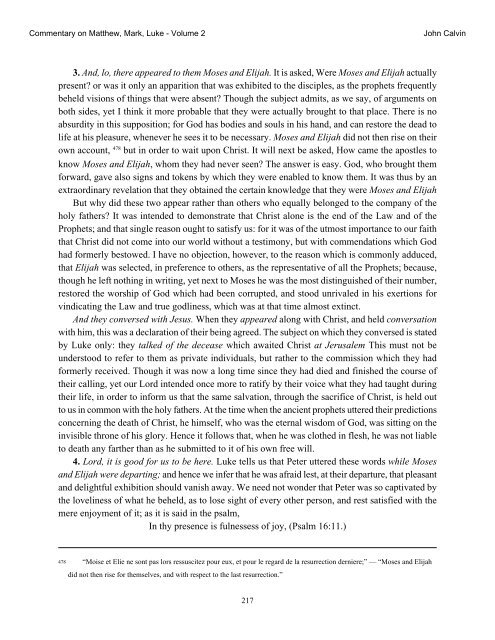Commentary on Matthew, Mark, Luke - Volume 2.pdf
Commentary on Matthew, Mark, Luke - Volume 2.pdf
Commentary on Matthew, Mark, Luke - Volume 2.pdf
Create successful ePaper yourself
Turn your PDF publications into a flip-book with our unique Google optimized e-Paper software.
<str<strong>on</strong>g>Commentary</str<strong>on</strong>g> <strong>on</strong> <strong>Matthew</strong>, <strong>Mark</strong>, <strong>Luke</strong> - <strong>Volume</strong> 2<br />
3. And, lo, there appeared to them Moses and Elijah. It is asked, Were Moses and Elijah actually<br />
present? or was it <strong>on</strong>ly an appariti<strong>on</strong> that was exhibited to the disciples, as the prophets frequently<br />
beheld visi<strong>on</strong>s of things that were absent? Though the subject admits, as we say, of arguments <strong>on</strong><br />
both sides, yet I think it more probable that they were actually brought to that place. There is no<br />
absurdity in this suppositi<strong>on</strong>; for God has bodies and souls in his hand, and can restore the dead to<br />
life at his pleasure, whenever he sees it to be necessary. Moses and Elijah did not then rise <strong>on</strong> their<br />
own account, 478 but in order to wait up<strong>on</strong> Christ. It will next be asked, How came the apostles to<br />
know Moses and Elijah, whom they had never seen? The answer is easy. God, who brought them<br />
forward, gave also signs and tokens by which they were enabled to know them. It was thus by an<br />
extraordinary revelati<strong>on</strong> that they obtained the certain knowledge that they were Moses and Elijah<br />
But why did these two appear rather than others who equally bel<strong>on</strong>ged to the company of the<br />
holy fathers? It was intended to dem<strong>on</strong>strate that Christ al<strong>on</strong>e is the end of the Law and of the<br />
Prophets; and that single reas<strong>on</strong> ought to satisfy us: for it was of the utmost importance to our faith<br />
that Christ did not come into our world without a testim<strong>on</strong>y, but with commendati<strong>on</strong>s which God<br />
had formerly bestowed. I have no objecti<strong>on</strong>, however, to the reas<strong>on</strong> which is comm<strong>on</strong>ly adduced,<br />
that Elijah was selected, in preference to others, as the representative of all the Prophets; because,<br />
though he left nothing in writing, yet next to Moses he was the most distinguished of their number,<br />
restored the worship of God which had been corrupted, and stood unrivaled in his exerti<strong>on</strong>s for<br />
vindicating the Law and true godliness, which was at that time almost extinct.<br />
And they c<strong>on</strong>versed with Jesus. When they appeared al<strong>on</strong>g with Christ, and held c<strong>on</strong>versati<strong>on</strong><br />
with him, this was a declarati<strong>on</strong> of their being agreed. The subject <strong>on</strong> which they c<strong>on</strong>versed is stated<br />
by <strong>Luke</strong> <strong>on</strong>ly: they talked of the decease which awaited Christ at Jerusalem This must not be<br />
understood to refer to them as private individuals, but rather to the commissi<strong>on</strong> which they had<br />
formerly received. Though it was now a l<strong>on</strong>g time since they had died and finished the course of<br />
their calling, yet our Lord intended <strong>on</strong>ce more to ratify by their voice what they had taught during<br />
their life, in order to inform us that the same salvati<strong>on</strong>, through the sacrifice of Christ, is held out<br />
to us in comm<strong>on</strong> with the holy fathers. At the time when the ancient prophets uttered their predicti<strong>on</strong>s<br />
c<strong>on</strong>cerning the death of Christ, he himself, who was the eternal wisdom of God, was sitting <strong>on</strong> the<br />
invisible thr<strong>on</strong>e of his glory. Hence it follows that, when he was clothed in flesh, he was not liable<br />
to death any farther than as he submitted to it of his own free will.<br />
4. Lord, it is good for us to be here. <strong>Luke</strong> tells us that Peter uttered these words while Moses<br />
and Elijah were departing; and hence we infer that he was afraid lest, at their departure, that pleasant<br />
and delightful exhibiti<strong>on</strong> should vanish away. We need not w<strong>on</strong>der that Peter was so captivated by<br />
the loveliness of what he beheld, as to lose sight of every other pers<strong>on</strong>, and rest satisfied with the<br />
mere enjoyment of it; as it is said in the psalm,<br />
In thy presence is fulnessess of joy, (Psalm 16:11.)<br />
478 “Moise et Elie ne s<strong>on</strong>t pas lors ressuscitez pour eux, et pour le regard de la resurrecti<strong>on</strong> derniere;” — “Moses and Elijah<br />
did not then rise for themselves, and with respect to the last resurrecti<strong>on</strong>.”<br />
217<br />
John Calvin

















